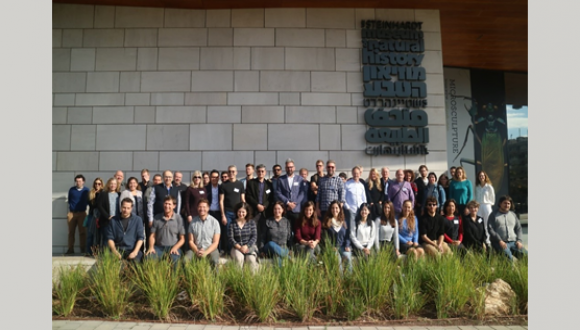December 2019: QBI/UCSF-TAU inaugural symposium
The Quantitative Bioscience Institute, Edmond J. Safra Center for Bioinformatics and the Blavatnik Center for Drug Discovery organized an inaugural joint-symposium at TAU.
The Quantitative Bioscience Institute (QBI) at University of California, San Francisco,(UCSF) Edmond J. Safra Center for Bioinformatics and the Blavatnik Center for Drug Discovery at TAU came together to launch an inaugural joint-symposium titled "Computational Biology and Drug Discovery" with the goal of forming collaborations, as well as making new connections and synergies between scientists at both institutions to help facilitate drug discovery through the use of computational approaches. It took place on December 4-5, 2019 at the Steinhardt Museum of Natural History at TAU.
The symposium was organized by Prof. Nevan Krogan, QBI Director, Prof. Ron Shamir, Head, Edmond J. Safra Center for Bioinformatics and Prof. Ehud Gazit, Academic Director, Blavatnik Center for Drug Discovery at TAU.
QBI has strong technology development for the quantitative collection of various kinds of data sets and TAU has leading expertise in the development of computational tools needed to analyze and integrate data sets together. By combining their strong capabilities, two sets of scientists enter what Krogan calls “the perfect marriage.”
The symposium was a great success. Twelve guests from UCSF and twenty TAU scientists spoke at the highly intense meeting. Among the TAU speakers, sixteen were Edmond J. Safra members (see speakers details below). A social program accompanied the scientific talks, and many new contacts were formed. An audience of nearly 100 attended the two dense days of talks. All scientists were enthusiastic about the many synergies and complementary capabilities of the two institutions, opening many potential collaboration partnerships. A memorandum of understanding for academic cooperation between UCSF and TAU was signed during the symposium. See the scientific program and photo gallery.
This symposium was the first step towards a long-term partnership that must be fueled through the raising of funds and philanthropic efforts. QBI and TAU are putting together seed-funding RFAs to support collaborations between the two institutes. The goal is to eventually set in place larger programs that facilitate an on-going exchange of scientific ideas. Krogan and Shamir are both determined to keep the momentum going.
“By now it is completely clear that the best investment a country can make is to invest in basic science because this is the basis for economic development, technological development, the improvement of medicine and the improvement of healthcare. It all starts with understanding science better and making discoveries and technological developments. This is where QBI and TAU can contribute together,” said Shamir.
TAU is equipped with the Edmond J. Safra Center for Bioinformatics and the Blavatnik Center for Drug Discovery, which bring together experts in engineering, medicine, computer science, biology, physics, statistics and chemistry under a common framework and goal. He is confident that these synergistic strengths will be doubled when joining forces with QBI.
Gazit felt that the scientific interest at the symposium was key in moving forward. “This meeting was unique in bringing people together from the computational and bioinformatics point of view and people who are involved with drug discovery. I think this mélange of different expertise is quite important and successful. We look forward to having our next symposium in San Francisco to further these collaborations,” he said.
“I truly believe that the relationship we are building between the Tel Aviv University and QBI is a perfect one, where we are bringing our tools together to help uncover new biology that will hopefully lead to new therapies against not just one disease, but a number of different diseases” said Krogan.
For more about the symposium and the vision of the planned collaboration, including video interviews, see here.





